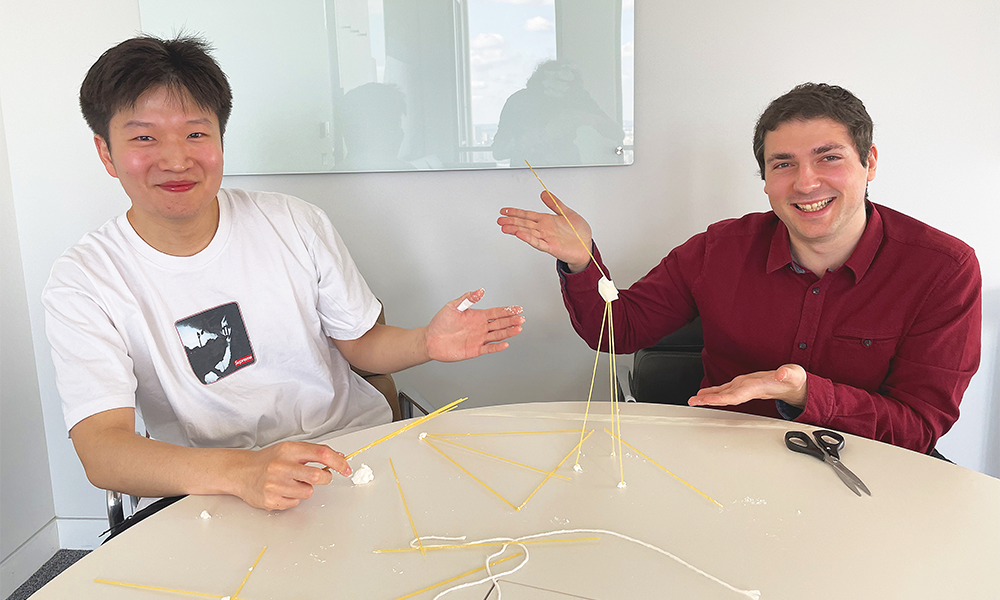The university’s business school is seeking participants for experiments in its Behavioural Research Lab at Canary Wharf’s One Canada Square

Subscribe to our free Wharf Whispers newsletter here
On the 38th floor of One Canada Square in Canary Wharf, two young men are attempting to build a structure.
Having only just met, they’ve been tasked with raising a marshmallow as high as possible using just dried spaghetti, string and masking tape.
They’re told their creation must stand without support for 10 seconds and be as creative as possible. They have five minutes…
It’s a sticky session.
Ignoring the tape and string at first, they tear into the marshmallow, employing it as a kind of gum to bind the lengths of pasta into flimsy tetrahedrons.
Attempts to go higher expose the sweet’s limitations as an adhesive and, as the clock ticks down, they tape a single length of spaghetti onto the top of one tripod and place a blob of mashmallow on its end.
They’re done.
The table is sticky with effort, but the task is complete and there are smiles all round.
While I’m not privy to the goings-on in all corner offices on the 50 floors of One Canada Square, I’m willing to bet this is the only one that’s a venue for pasta construction.
It’s a reflection perhaps of the growing diversity of the Wharf with financial services firms increasingly sitting alongside organisations specialising in education, life sciences, technology and construction.
What I’ve just witnessed is a session organised at UCL School Of Management’s Behavioural Research Lab.
Designed to allow the study of how and why humans do what they do in specific situations, the facility is run by Sharmay Mitchell.

a place for experimentation
“Once the professors have designed the studies, they come to me to recruit the participants and work out the logistics,” said the psychologist, who has more than 13 years of experience presiding over such experiments.
“Having run hundreds of studies, I think of the things other people might not.
“For example, a study might require that two participants be strangers, so you wouldn’t want them talking before the session.
“I’d also be watching to see if they were already friends and then split them up and put them with someone else, if needed.
“It’s also my job to ensure people have consented to being involved and to collect the data for the researchers, so it can be analysed.
“We always need more participants.
“Anyone over 18 can take part, although people need a good command of English so they can interact with others and understand instructions.
“It’s something completely different for people to do – something novel.
“Many don’t know UCL is here in Canary Wharf, so it’s an opportunity for them to find out what kind of research is happening on the estate.
“It’s exciting too. You get to meet new people who may be working or studying here and most of our studies last up to an hour, so it’s something that can be done in a lunch break.
“We usually give participants £10 in cash or a gift card for studies of that length, as a thank-you for their time.”
in person or online
Studies can be in person or online with participants typically unaware of why they are being asked to complete the tasks they are given.
“Everyone gets a debrief at the end so they can understand what they were doing and why,” said Sharmay, who studied at the University Of Westminster, UCL and King’s College London, before embarking on a career in academia at the London Business School.
“It usually takes a while for the analysis and write-up to come through – sometimes a year – but once a study is published I always like to send out that information so participants can discover the findings and how their contribution to knowledge has been used.
“All of our studies are approved by UCL’s ethics committee and the data is anonymous – each participant has a unique ID number and that’s how I’ll refer to them in the data.
“At the start we usually describe studies in general terms.
“For example, we wouldn’t tell them that they’ll be using spaghetti to build a tower, just that they’d be taking part in a creative task within a group.
“I find it fascinating that some people get so dedicated to the tasks they are given – but I like that they take it seriously as well.
“Once there was a study where people were asked to build a house out of Lego, with as much time as they liked.
“One participant spent two hours doing it because they were so into it.
“When participants are being observed they definitely behave differently and, if they think they’re not being observed, they do all sorts of things.
“In the previous lab I worked at, we ran a study where participants were asked to throw a ball into a basket and tell us how many times they managed to get it in.
“They got 10p for each successful attempt.
“The ones who thought they were not being observed mostly lied about the results, although a small percentage told the truth.”
a variety of tasks
Tasks in studies vary greatly.
Sometimes participants will fill in digital surveys or may be asked to do things on their own or in groups.
People wishing to take part enter their details on a database that Sharmay uses to source participants.
“That generates a research account for them where they can log in and choose studies they are interested in,” she said.
“We also send out emails about other studies as well to recruit people. There’s no limit to the number of studies a person can participate in. It can be as many or few as they wish, but some studies will have specific criteria.
“For example, the researcher will be looking for people who are in work full-time or things like that. The more people we have signed up, the more studies we can run.”
key details: UCL School Of Management’s Behavioural Research Lab
The Behavioural Research Lab is part of UCL School Of Management, which is located on the 50th and 38th floors of One Canada Square.
Anyone over the age of 18 can sign up to participate in its experiments.
Those wishing to do so can sign up via the QR code below or are welcome to email mgmt-lab@ucl.ac.uk for more information.
UCL School Of Management offers a wide range of undergraduate, graduate and executive programmes in management, entrepreneurship, information management for business, management science and business analytics.
Find out more about participating in studies or sign up here

case study: an experiment at UCL School Of Management
Velvetina Lim is a PhD student and teaching assistant at UCL School Of Management.
When I arrive at One Canada Square, she’s the one conducting the experiment with the spaghetti, which I witness – a task preceded by a short session where the two male participants ask each other searching questions.
“We try to do interactive tasks – where participants might do things with their hands, conduct surveys, evaluate ideas or have group discussions – and this ranges across different topics, such as social relationships or negotiating in job interview situations,” said Velvetina.
“My PhD is in social networks and creativity – exploring how connecting with each other can help us to discover the big ideas and how evaluating those ideas together strengthens social bonds.
“My hope in conducting these experiments is to see what specific aspects of an interaction we can isolate and manipulate and how that transfers onto specific outcomes, such as how much participants were talking to each other while trying to solve particular problems.
“Ideally during the experiments I’m in the room, but in the corner to make things as realistic as possible.
“With these experiments, the idea is you’re isolating variables in a controlled environment.
“However, hopefully they are also simulations of situations as well – in this case emulating a product design team checking in with each other at the start of the week before engaging in project meetings.
“The first part of the experiment uses established research tasks where strangers ask intimate questions to get them to be friends and really foster a social relationship.
“Sometimes one person in the group might secretly be part of the experiment so I can manipulate what questions are asked and whether the feedback they give is positive or negative.
“That allows us to investigate how those interactions relate to problem solving with the spaghetti.
“One of things I’m looking at is what happens if we label an idea ‘creative’ – how would that feed back into how the next idea is produced?
“I think this is a pertinent question about the relationship between feedback and creativity.
“When we’re looking at startups or advertising agencies, for example, we often notice how such iterative interactions across time have an impact on the creative flow that creatives experience.
“This helps shape the way managers and leaders feed back to them.
“I would certainly recommend people come by and participate in these sorts of tasks.
“It’s not just one way to earn a bit of quick money, but it’s a nice thing to do on a lunchtime break.
“I think that sometimes doing these tasks can help participants discover who they are or let them learn new things about themselves.
“It can also help people focus on things they might ask one another when forming new friendships.”
Read more: How Toby Kidman created a pub with soul at the Pacific Tavern
Read Wharf Life’s e-edition here
Subscribe to our free Wharf Whispers newsletter here
- Jon Massey is co-founder and editorial director of Wharf Life and writes about a wide range of subjects in Canary Wharf, Docklands and east London - contact via jon.massey@wharf-life.com



